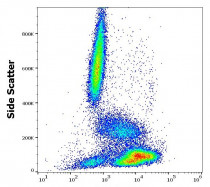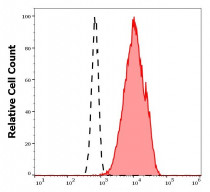ARG62935
anti-CD81 antibody [M38] (FITC)
anti-CD81 antibody [M38] (FITC) for Flow cytometry and Human,Cat,Rabbit
Immune System antibody; Microbiology and Infectious Disease antibody
Overview
| Product Description | FITC-conjugated Mouse Monoclonal antibody [M38] recognizes CD81 |
|---|---|
| Tested Reactivity | Hu, Cat, Rb |
| Tested Application | FACS |
| Specificity | The clone M38 reacts with CD81, a 25 kDa member of the tetraspanin family, expressed on majority of cells. |
| Host | Mouse |
| Clonality | Monoclonal |
| Clone | M38 |
| Isotype | IgG1 |
| Target Name | CD81 |
| Antigen Species | Human |
| Immunogen | MOLT-4 (human T-ALL cell line) |
| Conjugation | FITC |
| Alternate Names | CD antigen CD81; TAPA1; Tspan-28; S5.7; CD81 antigen; Target of the antiproliferative antibody 1; Tetraspanin-28; 26 kDa cell surface protein TAPA-1; CVID6; TSPAN28 |
Application Instructions
| Application Suggestion |
|
||||
|---|---|---|---|---|---|
| Application Note | * The dilutions indicate recommended starting dilutions and the optimal dilutions or concentrations should be determined by the scientist. |
Properties
| Form | Liquid |
|---|---|
| Purification Note | The purified antibody is conjugated with Fluorescein isothiocyanate (FITC) under optimum conditions. The reagent is free of unconjugated FITC and adjusted for direct use. No reconstitution is necessary. |
| Buffer | PBS, 15 mM Sodium azide and 0.2% (w/v) high-grade protease free BSA |
| Preservative | 15 mM Sodium azide |
| Stabilizer | 0.2% (w/v) high-grade protease free BSA |
| Storage Instruction | Aliquot and store in the dark at 2-8°C. Keep protected from prolonged exposure to light. Avoid repeated freeze/thaw cycles. Suggest spin the vial prior to opening. The antibody solution should be gently mixed before use. |
| Note | For laboratory research only, not for drug, diagnostic or other use. |
Bioinformation
| Database Links | |
|---|---|
| Gene Symbol | CD81 |
| Gene Full Name | CD81 molecule |
| Background | CD81 (TAPA-1), a member of the tetraspanin family, is expressed on virtually all nucleated cells, but above all on germinal center B cells. CD81 forms complexes with other tetraspanin proteins, integrins, coreceptors, MHC class I and II molecules, and influences adhesion, morphology, activation, proliferation and differentiation of B, T and other cells – e.g. in muscles CD81 promotes cell fusion and myotube maintenance. CD81 has been also identified as a receptor for the hepatitis C virus. |
| Function | May play an important role in the regulation of lymphoma cell growth. Interacts with a 16-kDa Leu-13 protein to form a complex possibly involved in signal transduction. May act as the viral receptor for HCV. [UniProt] |
| Highlight | Related products: CD81 antibodies; Anti-Mouse IgG secondary antibodies; Related news: Tools for studying Exosomes |
| Research Area | Immune System antibody; Microbiology and Infectious Disease antibody |
| Calculated MW | 26 kDa |
| PTM | Not glycosylated. |
Images (2) Click the Picture to Zoom In
-
ARG62935 anti-CD81 antibody [M38] (FITC) FACS image
Flow Cytometry: Human peripheral whole blood stained with ARG62935 anti-CD81 antibody [M38] (FITC) (20 µl reagent / 100 µl of peripheral whole blood).
-
ARG62935 anti-CD81 antibody [M38] (FITC) FACS image
Flow Cytometry: Separation of lymphocytes (red-filled) from neutrophil granulocytes (black-dashed). Human peripheral whole blood stained with ARG62935 anti-CD81 antibody [M38] (FITC) (20 µl reagent / 100 µl of peripheral whole blood).
Clone References









